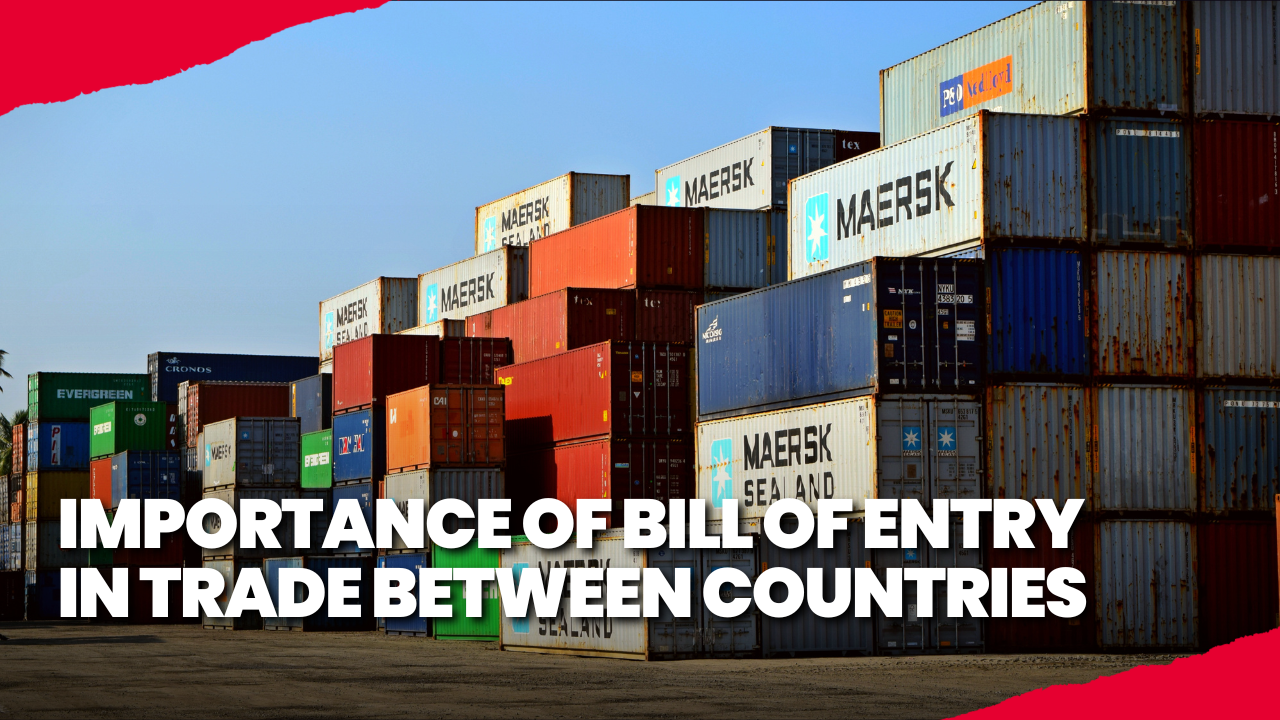
Imagine bringing valuable goods into India, only to get held up at customs because you’re missing one critical document. That document is the Bill of Entry. If you’re involved in cross-border trade, understanding what is a Bill of Entry and it’s Importance is not optional but necessary.
Indian Customs receives this legally required document when goods enter the country. It enables the clearance process, facilitates duty payments, and ensures compliance through a proper audit trail, all of which are beneficial for smooth, lawful imports.
This blog will tell you all you need to know about what a bill of entry is and why it matters in international trade.
What is a Bill of Entry?
A bill of entry is a form that an importer or customs broker fills out and sends to Indian Customs to let them know that goods have arrived. It gives customs officials all the information they need to figure out how much duty to charge and make sure that the items comply with all import rules.
The Customs Act of 1962 says that you have to file a bill of entry before you can import goods. The importer can’t legally get or use the shipment without it.
Different kinds of Bill of Entry in India
There are different types of bill of entry documents, and each one has a different purpose depending on what the import is and why it is being brought in.
Bill of Entry for Home Consumption
After paying all customs duties, products are ready for use in India. This is the type that people use the most.
Bill of Entry for Warehousing
This is used when imported items are put in a bonded warehouse and customs duties are put off until the products are taken out.
Bill of Entry for Ex-Bond Clearance
Filed when items stored in a warehouse are later approved for home use, and duties are paid when the commodities are taken out of the warehouse.
Advance Bill of Entry
Filed before the items got to India. It speeds up customs processing, especially for packages that need to get there quickly or that are quite significant.
Re-import Bill of Entry
Filed when products that were exported before are being brought back into the country, often for repair, replacement, or return. Under some circumstances, concessional duties may apply.
High Sea Sales Bill of Entry
Used when the items are sold while they are still on their way (on the high seas). The buyer files this bill, not the original importer, to get the goods after they have cleared customs.
Who has to file a bill of entry?
- Importers
- Customs brokers
- Freight forwarders who have permission from Bonded warehouse customers
- International returns for online retailers
Additionally, international sites like Amazon, Flipkart Global, and Alibaba Express require sellers and importers to provide legal bills of entry while they are going through customs.
Also Read This: Understand the Roles of Consignor and Consignee in Shipping
Importance of the Bill of Entry
The bill of entry is pivotal to the overall import procedure and trade compliance. It is necessary for customs clearance, provides legal documentation of import, and is required to get an input tax credit under GST. It also helps with keeping track of inventory and logistics, as well as keeping track of legal and audit paperwork. An accurately filed bill of entry makes sure that exporters can handle return shipments and importers may do business internationally (as with Amazon Global Selling) without any delays caused by rules.
Paying Customs Duties
After submitting the bill of entry, the importer must pay the taxes that apply.
- Basic Customs Duty (BCD)
- Integrated GST (IGST)
- Extra charge for social welfare
- Anti-dumping duty (if it applies)
The assessable value, which comprises cost, insurance, and freight (CIF) as shown on the import invoice, is used to figure out duties. Customs only lets items go when they have paid all of their duties and passed a compliance check.
Wrapping It Up
International trading might seem like a challenge. But documents like the bill of entry help you find your way through those difficulties. If you want your goods to get through Indian customs without any problems, you need to know what a bill of entry is, whether you are a first-time importer or an experienced dealer. This one document is necessary for every step of the import process, from paying duties to obtaining GST credit and avoiding delays. So, don’t think of it as a formality; think of it as a key to opening up business opportunities everywhere.
FAQs
A bill of entry is a document that informs Indian Customs about products that have been brought into the country, assesses duties, and gets permission for delivery.
Under the Indian Customs Act, all imports must have a bill of entry.
Yes, importers can get a GST input credit based on the IGST amount shown on the bill of entry.
Also Checkout Our YouTube Channel: @limeinstituteofexportimport






